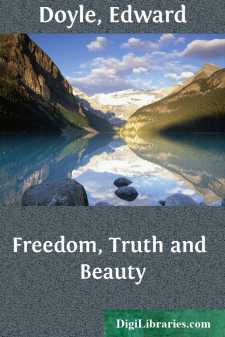Categories
- Antiques & Collectibles 13
- Architecture 36
- Art 48
- Bibles 22
- Biography & Autobiography 813
- Body, Mind & Spirit 142
- Business & Economics 28
- Children's Books 14
- Children's Fiction 11
- Computers 4
- Cooking 94
- Crafts & Hobbies 4
- Drama 346
- Education 46
- Family & Relationships 57
- Fiction 11829
- Games 19
- Gardening 17
- Health & Fitness 34
- History 1377
- House & Home 1
- Humor 147
- Juvenile Fiction 1873
- Juvenile Nonfiction 202
- Language Arts & Disciplines 88
- Law 16
- Literary Collections 686
- Literary Criticism 179
- Mathematics 13
- Medical 41
- Music 40
- Nature 179
- Non-Classifiable 1768
- Performing Arts 7
- Periodicals 1453
- Philosophy 64
- Photography 2
- Poetry 896
- Political Science 203
- Psychology 42
- Reference 154
- Religion 513
- Science 126
- Self-Help 84
- Social Science 81
- Sports & Recreation 34
- Study Aids 3
- Technology & Engineering 59
- Transportation 23
- Travel 463
- True Crime 29
Freedom, Truth and Beauty
by: Edward Doyle
Description:
Excerpt
THE QUALITY OF THE WORKS OF EDWARD DOYLE
The quality of Edward Doyle's work was appraised by Ella Wheeler Wilcox in the following article by Mrs. Wilcox which appeared in the New York Evening Journal and the San Francisco Examiner, in 1905:
Shut your eyes and bind them with a black cloth and try for one hour to see how cheerful you can be. Then imagine yourself deprived for life of the light of day.
Perhaps this experiment will make you less rebellious with your present lot.
Then take the little book called "The Haunted Temple and Other Poems," by Edward Doyle, the blind poet of Harlem, and read and wonder and feel ashamed of any mood of distrust of God and discontent with life you have ever indulged.
Mr. Doyle has been blind for the last thirty-seven years; he has lived a half century.
Therefore he still remembers the privilege of seeing God's world when a lad, and this must augment rather than ameliorate his sorrow.
He who has never known the use of eyes cannot fully understand the immensity of the loss of sight.
I hear people in possession of all their senses, and with many blessings, bewail the fact that they were ever born.
They have missed some aim, failed of some cherished ambition, lost some special joy or been defeated in some purpose.
A GREAT SOUL
And so they sit in spiritual darkness and curse life and doubt God. But here is a great soul who has found his divine self in the darkness and who sends out this wonderful song of joy and gratitude.
Read it, oh, ye weak repiners, and read it again and again. It is beautiful in thought, perfect in expression and glorious with truth.
My life is in deep darkness; still, I cry,
With joy to my Creator, "It is well!"
Were worlds my words, what firmaments would tell
My transport at the consciousness that I
Who was not, Am! To be—oh, that is why
The awful convex dark in which I dwell
Is tongued with joy, and chimes a temple bell.
Antiphonally to the choirs on high!
Chime cheerily, dark bell! for were no more
Than consciousness my gift, this were to know
The Giver Good—which sums up all the lore
Eternity can possibly bestow.
Chime! for thy metal is the molten ore
Of the great stars, and marks no wreck below.
I know a gifted and brilliant man in New York who is full of charm and wit in conversation, but the moment he touches a pen he becomes, as a rule, a melancholy pessimist, crying out at the injustice of the world and the uselessness of high endeavor in the field of art.
When urged to take a different mental attitude for the sake of the reading world, which needs strong tonics of hope and courage, rather than the slow poison of pessimism, however subtly sweet the brew, my friend responds that "The song and dance of literature is not my special gift." And he is obliged to "speak of the world as I find it."
He is an able-bodied man, in the prime of life, with splendid years waiting on his threshold to lead him to any height he may wish to climb. But to his mental vision, nothing is really "worth while."
What a rebuke this wonderful poem of Edward Doyle's should be to all such men and women....


